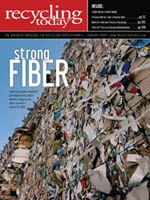ASC Releases Report on Scrap Ferrous Exports
The American Scrap Coalition (ASC), Washington, D.C., has released a report that addresses what it says are unfair trade practices by many overseas steel companies.
The report, Raw Deal: How Governmental Trade Barriers and Subsidies Are Distorting Global Trade in Raw Materials, documents how some governments are increasingly participating in the race for raw materials and are intervening in commodity markets to protect their domestic industries and to sustain economic growth.
The study, written by Wiley Rein LLP, Washington, and sponsored by the ASC, details the growth of trade-restrictive measures designed to secure supplies of low-cost raw materials to benefit these countries’ domestic industries. "These raw material trade barriers are causing huge distortions in global investment in manufacturing industries," says Alan Price, a partner at Wiley Rein and one of the study’s authors. "These barriers are being used by certain U.S. trading partners to game the system to their advantage while prejudicing those countries that are playing by the rules."
The report documents these alleged distortions, including:
• Export Barriers—China, Russia, Ukraine, India and other countries have enacted a number of barriers to the export of raw materials, including export bans, export taxes, export quotas and export licensing restrictions. These governments use such restrictions to discourage exports, promote the development of certain domestic industries and, according to the World Trade Organization, to "subsidize domestic downstream industries."
• Foreign Investment Barriers—These governments also have implemented measures that prohibit or restrict foreign investment in their own raw material resources.
• Subsidized Acquisitions of Overseas Raw Material Production Assets—While restricting foreign investment in their own raw material resources, these governments are mobilizing public resources to target overseas markets and tilt the global raw material trade in their favor.
"These barriers adversely impact U.S. manufacturers as well as the global economy as a whole," Price says. "As a result of these trade barriers, manufacturers who play by the rules face limited supplies and higher prices for strategic raw materials. More needs to be done to strengthen the international framework for addressing such violations, and we look forward to working with the new administration on this issue."
"Russia’s scrap export tax is particularly harmful since it has a great deal of scrap available for export," says Thomas Danjczek, president of the Steel Manufacturers Association, Washington. "And while steel scrap prices have fallen sharply in recent months, this is not a reason to stop our efforts to remove these barriers," he adds.
Price says, "While the recent global economic crisis has reduced raw material prices, the inherent problems associated with raw material protectionism persist and will resurface when the economy rebounds. The current climate of falling prices is the perfect opportunity to insist on permanent removal of these trade barriers."
The ASC study is available at www.wileyrein.com/raw_deal.
Commercial Alloys Files for Bankruptcy Protection
Commercial Alloys Corp., based in Twinsburg, Ohio, has filed for Chapter 11 bankruptcy protection.
Despite the filing, Anthony Musarra of Commercial Alloys says the company will continue to operate and is trying to decide what path it will take to return from Chapter 11. He adds that Commercial Alloys is presently reviewing a host of options, including financing from other banks, private equity firms and other avenues, including self financing.
The company is involved in aluminum scrap collection, processing and aluminum ingot production.
Along with its headquarters in Twinsburg, Commercial Alloys operates facilities in Scottsboro, Ala.; Jacksonville, Fla.; and Minerva, Ohio. Currently the company’s Alabama plant is idled, while its plants in Twinsburg and Jacksonville are operating at half capacity. The company’s facility in Minerva is operating at full capacity.
Despite the setback, Mussara says the company is confident that it will exit bankruptcy protection. "This is a turnaround. We will come back," he adds.
Nucor Announces $45 Million Expansion of Darlington, S.C., Steel Mill
Nucor Corp., Charlotte, N.C., has announced plans to invest $45 million during the next five years at its steel mill in Darlington, S.C. The expansion is for capital improvements and will not result in any more jobs at the plant.
The project will include improvements to the existing steel mill facility, such as upgraded equipment in the rolling mills and improvements to the scrap conveyor, alloy handling systems, ductwork, railroad tracks and cranes.
Further investments in Nucor’s Darlington facility will be made through the expansion of the existing baghouse, the acquisition of land and the growth in the mill’s special bar quality capabilities.
"We are proud to be able to continue our improvement and expansion to our Darlington Steel Mill, which is due primarily to the efforts of our dedicated employees and the support that we have received from the local community," says Mike Gurley, vice president and general manager of Nucor Steel South Carolina.
The Darlington Mill produces concrete reinforcing bars, hot rolled bars, rod, light shapes, structural angles and channels using 100 percent recycled steel.
The products manufactured at the Darlington mill are widely used, serving primarily the agricultural, automotive, construction, energy, furniture, machinery, metal building, railroad, recreational equipment, shipbuilding, heavy truck and trailer market segment.

Explore the January 2009 Issue
Check out more from this issue and find your next story to read.
Latest from Recycling Today
- BMW Group, Encory launch 'direct recycling’ of batteries
- Loom Carbon, RTI International partner to scale textile recycling technology
- Goodwill Industries of West Michigan, American Glass Mosaics partner to divert glass from landfill
- CARI forms federal advocacy partnership
- Monthly packaging papers shipments down in November
- STEEL Act aims to enhance trade enforcement to prevent dumping of steel in the US
- San Francisco schools introduce compostable lunch trays
- Aduro graduates from Shell GameChanger program





